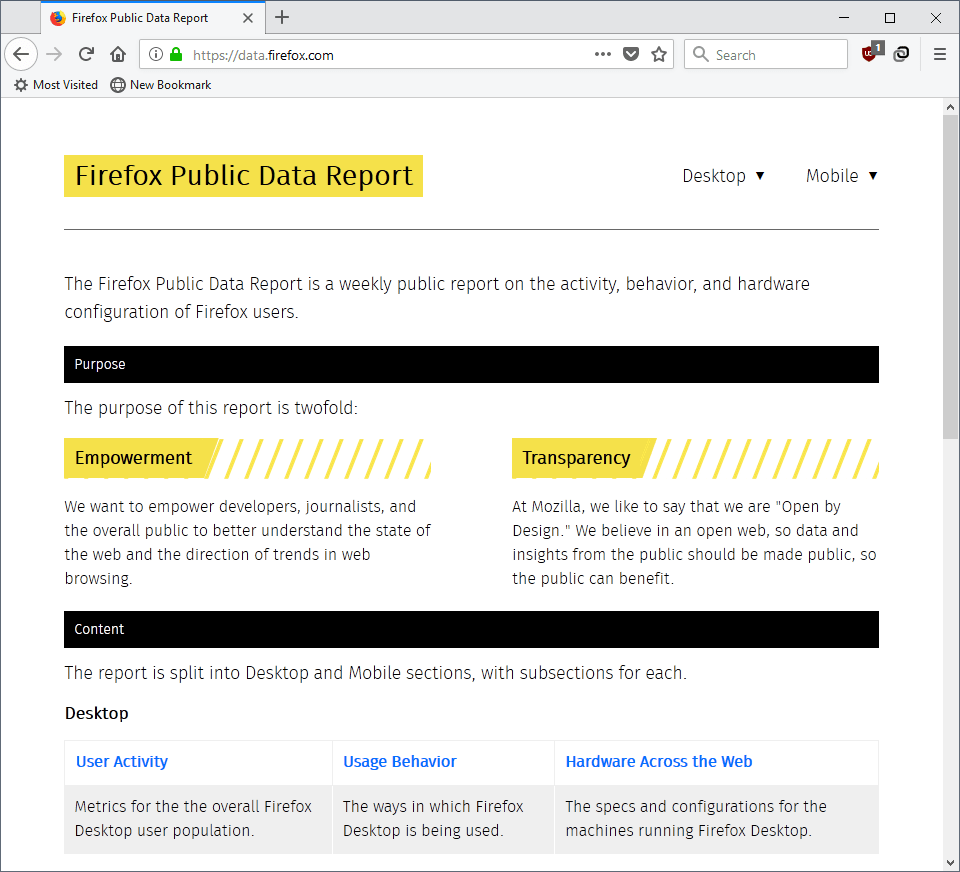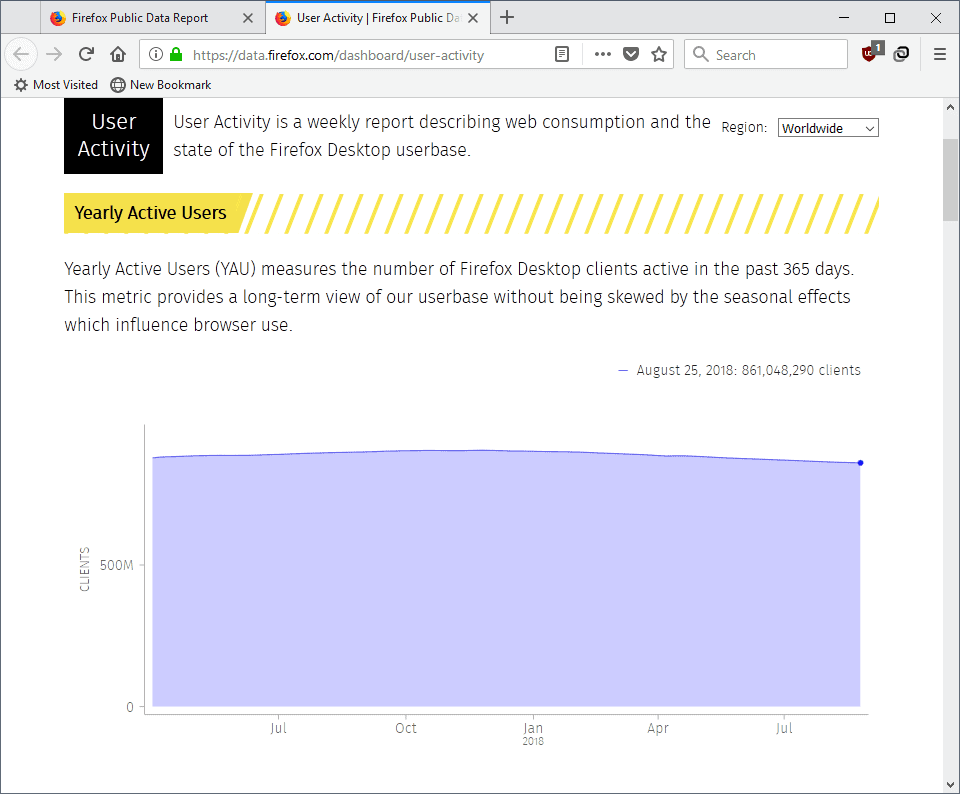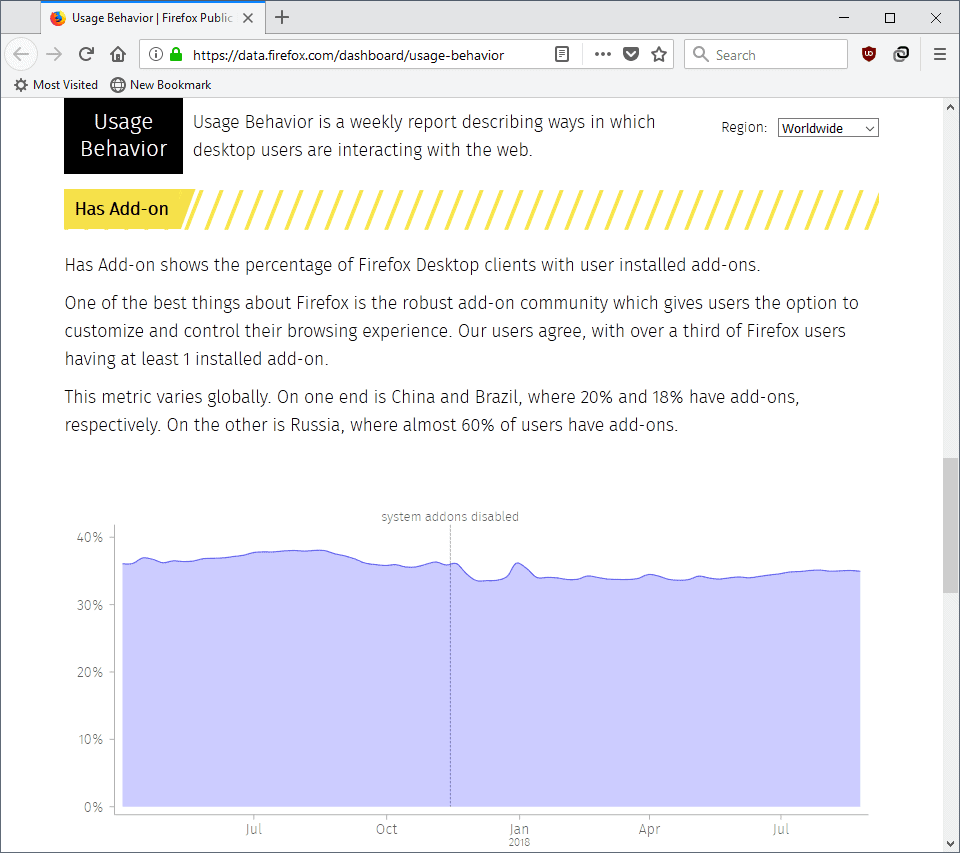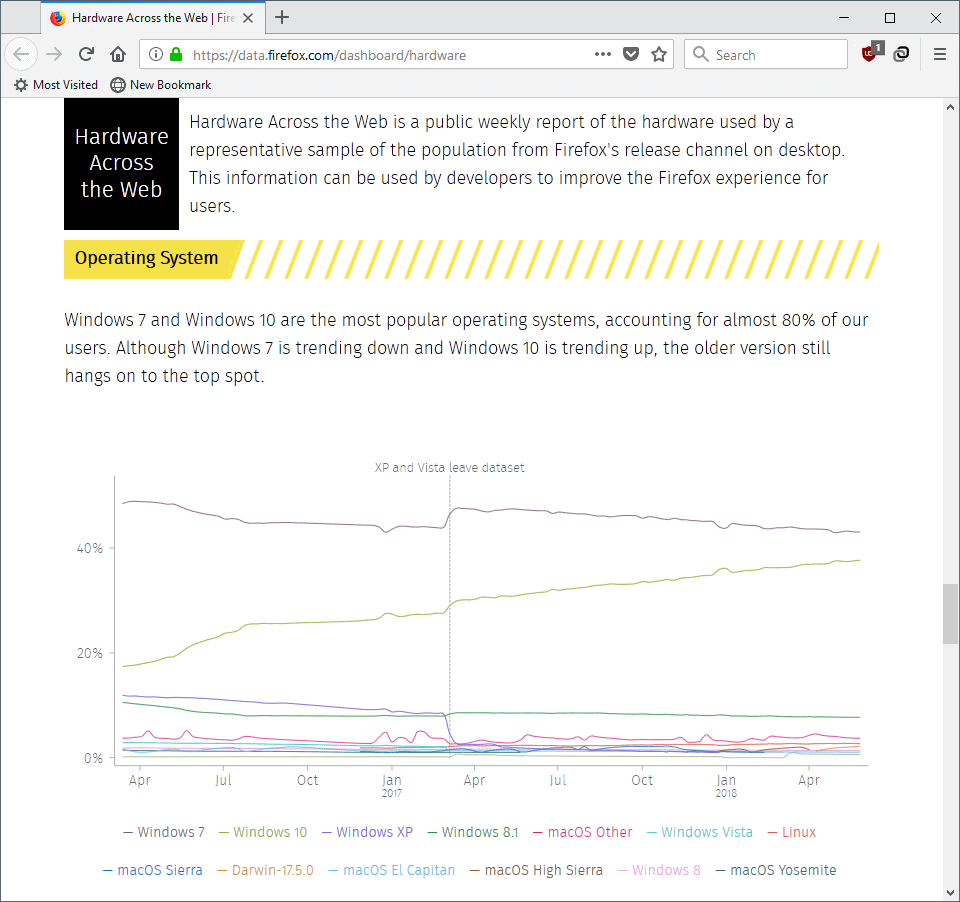Mozilla publishes Firefox Public Data Report

Firefox Public Data Report is a new weekly report by Mozilla that offers current and historic statistics on user metrics, usage behavior, and configurations on mobile and desktop operating systems.
Has Firefox lost users in the last twelve months? What are the most widely used languages, the percentage of Firefox installations with Tracking Protection enabled or add-ons installed, or the top operating system?
The Firefox Public Data Report answers these and other questions. The data is updated weekly and Mozilla aims to be more open about core Firefox metrics and to provide anyone with a better understanding of the state of the Web and Firefox in particular.
Firefox Public Data Report

The main URL of the report is https://data.firefox.com/. Just click on the link to open the main report page in any modern web browser. The report is split into desktop and mobile sections, and each section is divided into "user activity", "usage behavior", and "hardware across the Web".
Note: mobile reports are not yet available at the time of writing.
Some settings support the selection of regions or different time periods to narrow the data sets down.
User Activity

User Activity is all about the "state of the Firefox Desktop userbase" and web consumption. The report displays more than a year worth of the following statistics:
- Yearly Active Users
- Monthly Active Users
- Daily Usage
- Average Intensity
- New Profile Rate
- Latest Version
Probably most interesting from a Firefox enthusiasts' perspective are the yearly and monthly active users. Firefox had about 900 million active yearly users in August 2017 and about 861 million in August 2018.
Mozilla recorded about 277 million monthly active users in August 2017 and about 256 million monthly active users in August 2018.
Usage Behavior

Usage Behavior lists "ways in which desktop users are interacting with the web". The report lists top languages, the percentage of tracking protection that is set to on always, the percentage of users with add-ons, and the top ten add-ons.
US English is the leading language with about 40% of all installations. It is followed by German with about 11%, French with 6.5%, and Russian and Spanish with about 5% each.
Always on tracking protection is on the rise. About 1.3% of all Firefox users have turned on the feature permanently.
Add-on usage sits at about 35% of all Firefox desktop clients, a drop from about 38% a year ago. In other words, only a third of Firefox users use add-ons.
The top ten add-ons as of August 2018 are:
| Rank | Add-on | Usage |
|---|---|---|
| 1 | Adblock Plus | 9.384% |
| 2 | uBlock Origin | 3.296% |
| 3 | Video DownloadHelper | 2.697% |
| 4 | Cisco Webex Extension | 1.411% |
| 5 | Визуальные закладки | 1.255% |
| 6 | Search Extension by Ask | 1.184% |
| 7 | AdBlock | 0.969% |
| 8 | SaveFrom.net помощник | 0.925% |
| 9 | Советник ЯндекÑ.Маркета | 0.868% |
| 10 | Ghostery – Privacy Ad Blocker | 0.795% |
Hardware across the Web

The third and final section is all about hardware used by a "representative sample of the population from Firefox's release channel on desktop". It lists information about used CPUs and GPUs, operating systems, whether Flash or Unity is supported, or the display resolution.
Closing Words
The report provides excellent insight into the Firefox ecosystem, distribution of the browser, hardware and software use, and trends.
While Firefox use seems to drop year over year when you check usage share analytics services, the drop is not really reflected in yearly or monthly active users. While there has been a drop, it is not nearly as big to explain the discrepancy.
The publication of the report provides users and journalists with statistical data that Firefox enthusiasts and journalists may use to refute rumors or in the analysis of trends.
Now You: What is the most interesting revelation from the report? (via Born)






















Estimation of the number of Waterfox users based on Mozilla telemetry data:
https://www.reddit.com/r/firefox/comments/9bswmn/estimation_of_the_number_of_waterfox_users_based/
https://www.reddit.com/r/waterfox/comments/9bs7b3/estimation_of_the_number_of_waterfox_users_based/
“Firefox typically releases major updates roughly every 50 days.”
.
What a stupid waste of manpower resources.! A 6-monthly upgrade cycle would have been more appropriate and sane.
Seems, Mozilla Firefox has also been trying to copy Google Chrome’s rapid upgrade cycle, besides copying Chrome’s UI and web-extensions. Google can afford to waste resources but not Mozilla.
@AnorKnee Merc
In my opinion, even 6 months is far too frequent except for security updates. But rapid release is an industry-wide plague right now, so it’s hard to single out Mozilla on that count.
I’m surprised NoScript isn’t in the top ten list of extensions. Wait, no I’m not. Well, maybe just a little.
interesting data, so Firefox developers need to pander to users with a 64x bit Intel Haswell CPUs that has 2-4 cores clocked at 2-3Ghz that comes with an integrated GPU, 2-8GB RAM, Windows 7/10, 1366×768 or 1920×1080 resolution
the system I use falls into some of these parameters
Firefox sends a lot more data to Mozilla and partners than what is shown here, sometimes very crispy personal data.
Their attempt at being “transparent” is just one more lie from them.
Evidence? When I disable the stuff that interacts with Mozilla servers and sniff traffic, I’m not seeing evidence of this.
No evidence?? huh? ohhh.. is that because you work as in the PR department at Mozilla, I saw your linkedin profile.
@YuliyaNose
Were you replying to me? You couldn’t have seen my LinkedIn profile because, in the first place, I don’t have one. In the second place, “John Fenderson” is not really my name.
For the record, I certainly don’t work for Mozilla in any capacity, especially not PR. If I did, I’d be fired by now anyway because I tend to be very critical of Mozilla’s decisions around Firefox.
The Decentraleyes addon should have a more prominent position, same for HTTPS Everywhere
PS: Intel iGP is the most common GPU, so webrender will working on intel igp very good in the future of the mozilla webrender project
PS2: most users don’t have much RAM so the https://bugzil.la/memcontent-shrink project is nice to see
Oops, typo it’s https://bugzil.la/memshrink-content
It’s sad to say, but all I can see is a future with a lot of time lost if I will decide to move to Firefox Quantum thanks to majority of users and the developers who follow them.
With good intentions I found last week web extension alternatives to some critical add-ons I need like ‘Auto CloseTab’ and better choices too like ‘Kantu: Fresh Browser Automation’, so after installing a portable version I tried it a little with other add-ons.
– missing api to tile tab in the same window (appalling)
– old iMacros work well with All-In-One-Sidebar, this means 2 click only and no new window pop-up. Yes, I can start macro from bookmarks (supported by Kantu too) but both add-ons don’t work in default incognito mode due new restrictions
– while browsing I usually interract with more than 10 add-ons (permissions, cookies, picking images, enable\disable scripts, remove elements, …). With add-on bar I can do it with one click and good arrangement
– No Scripts add-on looks terrible especially the site list (maybe I’m wrong, but there is not a compact view?). I will have to start from scratch with uMatrix
– I will need to learn CSS hoping to find a more compact view and few other improvements
– I will have to spend time to reorganize a lot of feeds with Feedbro
– still missing some add-on like FlashGot (not interested in Video DownloadHelper; the first one with JD it’s more than enough)
All of this with half an hour of testing and only a tenth of related web extension installed. What I can say, maybe its my fault and I am a vintage and growler (desktop) user. :-)
Powerful addons is impossible in the Quantum. Flashgot is of course cannot be ported. Video DownloadHelper actually does not work too, you need to install some Companion App for it to actually work. Better just use some powerful software like youtube-dl.
If you’re using old PC I suggest you don’t use Quantum, it eats a lot of memory, more than Google Chrome.
https://www.reddit.com/r/firefox/comments/8den92/i_am_seriously_missing_flashgot_for_ff_quantum/
I can run Quantum without CPU or memory issues. My current Firefox performance is affected due to the number of add-ons. With basic profile (-no remote) starting and surfing with FX-ESR is already fast.
It’s good if you can run Quantum without problem. Many people have memory issues with Quantum, you can find those threads on the reddit place you linked or search ‘firefox quantum eats memory’.
https://support.mozilla.org/en-US/questions/1202162
About the flashgot, just like I said above it’s impossible because the browser itself doesn’t have the capability to do so. The new extension system is running in sandboxed environment.
Flashgot author said that he would definitely release a new Flashgot before the end of Sept 2018, but we heard nothing until today.
Could be, I used Quantum only with a tenth of add-ons installed. Surely I’m not happy with current ESR CPU usage. RAM usage? 1.040.566K and It’s funny that you design a new browser UI making space for ‘something’ (no add-on bar, ecc) and you not consider that maybe small laptops or convertible PC maybe have less than 4GB of RAM. Ok I’m on old hardware, but it is an assembled PC and before SSD I made a litle upgrade with RAM.
About FlashGot I don’t know the implications for grabbing related to a sandboxed environment, but I’m trusting him with no hurry. Quantum was like a forest fire (maybe arson); in the meantime we have to wait the slow regrowth of the ecosystem. Unfortunately, seems that fertility soil isn’t what it was. Sad for biodiversity and I’m a species at risk of extinction in this ecological niche.
I agree, browser ‘power’ users are niche. People I know don’t use extensions or just use adblock for the browsers.
The main reason I’m still in legacy Firefox because there’s no way to open MHT files in the Firefox Quantum. I tried Converting the files to PDF or other things but did not work. If one day my Firefox can’t open sites anymore, my only option is to move to other browsers, Chrome and IE have been supporting MHT files since forever but Firefox can’t even do that without legacy extension. Some other extension that are important but not essential to me are DownThemAll, Flashgot, RefControl, FXIF, and Classic Theme Restorer. There’s no replacement for them at all. I know it’s impossible because I’m an extension developer, I made an extension to replace a legacy extension which was broken since Firefox 48+.
Easy analogy for ‘sandboxed’ environment is.. Imagine a newspaper boy want to deliver a newspaper to your home but your home is encased in glass room like greenhouse. The only way to deliver the newspaper is (Mozilla)making a door. But Mozilla does not provide the way so there’s no way for the boy to go into your home. Alternatively is by forcing to make a way like what Video Download Helper did, the boy asked you to dig a hole to outside your home. But you can’t determine that is the hole safe or not, the boy would have access to your home all the time now.
If you have time, you can read this post by DownThemAll’s author: https://mail.mozilla.org/pipermail/dev-addons/2016-December/002367.html
You can also read the post by Chuck Baker(FEBE’s author): https://blog.mozilla.org/addons/2015/08/21/the-future-of-developing-firefox-add-ons/comment-page-5/#comments
Did I mention I checked the comments by using rss function in Firefox? Probably you won’t hear it anymore in the future because Mozilla also planned to remove this ancient feature only used by power users. Firefox said the reason was “Outdated and hard to maintain code”, it’s like they’re saying RSS’ specifications changing every year and they couldn’t maintain it.. I have wrote some of feed reader/fetcher code in 2 programming languages and haven’t changed them at all since around 6-8 years ago, so I call the reason a bullshit.
So sad what Firefox has become.. They sacrifice essential functionality over speed. It’s like riding a car without mirror or windshield, as long as it can increase speed, Mozilla will just discard them.
Sorry this has became quite long rant, I just write what I want and it became long like this.
Anyway thanks for the discussion, I quite enjoyed it :)
> If you’re using old PC I suggest you don’t use Quantum, it eats a lot of memory, more than Google Chrome.
This is an obvious lie, Chrome now loads up AN ENTIRE CONTENT PROCESS just for *each* third-party iframe in a website. That’s like you can have *30* content processes when you visit TechCrunch or similar bloated sites.
Just install uBlock and other tracking blocker addons and you can browse without problem. I also used those extensions with Firefox but still it got higher memry usage. Chrome use around 800-1400MB RAM while Firefox will keep going up to >3 GB RAM with just 4-5 tabs. It seems like Quantum has bad memory leak problem.
No it’s not a lie, it’s based on my and many people experience. As I no longer have the Quantum Firefox installed, I can’t make a benchmark to compare. You’re free to compare it by yourself.
Hey, try out Firefox Nightly with WebRender enabled (“gfx.webrender.all” set to true in about:config) you’ll experience +60 FPS buttery smooth scrolling and browsing if you have a good GPU.
Uhmmm… Probably a smarthphone is more performing than my old PC, but it doesn’t want to break and after a little upgrade with SSD I’m still happy with it.
There’re no particularly issues with scrolling o browsing with my FX and I can only image if I’ll buy a new PC and change plan to fiber. But at this point I have a question: is the availability of WebRender a limiting factor for implementing customization in Quantum? Maybe I’m wrong but: no. Simply I don’t want to trade less ‘click’ or functional add-ons for a little bit of performance.
WebRender doesn’t remove any customization, but it’s only on Nightly for now.
That’s what I meant, I don’t see the connection with WebRender and the points I’ve mentioned. I know that Quantum improve render speed, but there are also downwside related to customizazion or powerful addons during browsing (to be converted in time lost). It’s a crime for 0,% performance improve photon to make happy some users (sidebar, botton bar, add-on bar) and maybe mustn’t miss the train compared with Vivaldi customization or wistful forks.
If I have to focus on add-on usage sits at about 35% or the funny August list (except for uBlock), seems that developers don’t have to worry.
If I’ve made above consideration means I’m trying to switch to Quantum, but right now I have much more to lose than my current settings.
” You need to enable JavaScript to run this app. ”
“Let’s be Transparent” looks different in my eyes – MEGAFAIL @ Mozilla
Yes, telemetry, bitch! ~ Jesse Pinkman
Mozilla seems to know a lot about its userbase, for a browser which “doesn’t track” its users…
They should rename the tracking protection option to something more along the lines: “Only allow Mozilla to track me”. Seems to fit better. They have already taken the update options away from user, which means Mozilla is in control of your browser more than ever, at this point they can do whatever they want to “your” browser.
Firefox or Windows 10… equally bad; equally malicious.
Basic telemetry about number of users and similar things is done even in the leading anonymizer in the world: the Tor network and the Tor Browser! (check out: https://metrics.torproject.org/ ) AND THAT’S BECAUSE PRIVACY RESPECTING BASIC TELEMETRY IS POSSIBLE DUUH!
@Yuliyaface: “Basic telemetry about number of users and similar things is done even in the leading anonymizer in the world”
Telemetry in Tor is not only optional, it’s disabled by default, as it should be.
“THAT’S BECAUSE PRIVACY RESPECTING BASIC TELEMETRY IS POSSIBLE”
Nobody said it’s not. The trouble is that it’s not possible as an end user to know is it’s being done in a privacy-respecting way, so you can’t trust it.
> Telemetry in Tor is not only optional, it’s disabled by default, as it should be.
That’s false, it’s there by default otherwise they would’ve never gotten those 2 million users to each enable it.
@Goal:
It’s easy enough to verify that there’s no need to engage in speculation on this.
Worry not. That is really general information.
…Insert Pinocchio smiley…
“While Firefox use seems to drop year over year when you check usage share analytics services, the drop is not really reflected in yearly or monthly active users. While there has been a drop, it is not nearly as big to explain the discrepancy”
Possible reasons:
– Absolute number of people using the web is steadily increasing, we are now at around 2 billion Desktop Users, this was only 1 billion a couple of years ago. 10% of 2 billion is 200 million.
– Monthly Active Users is probably calculated in a way to mitigate the changes (For example everyone that quickly checks out Firefox but goes back to Chrome is counted as a user)
Still 277M down to 256M is a 7.5% drop.
The Daily Active User data omitted by Mozilla would be more sensitive to the user loss, since it does not include all those people that only try out Firefox.
“Still 277M down to 256M is a 7.5% drop.”
Firefox has less users. This is just enough to prove it.
Daily Active User data have a lot of fluctuations, and Monthly Active Users is a kind of partial average, helping us interpreting data.
None, just sad for gorhill seeing his add-on between all that bullshit.
The popularity ranking of extensions can also be checked at any time here :
https://addons.mozilla.org/firefox/search/?sort=users&type=extension